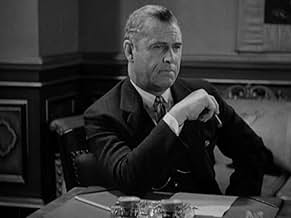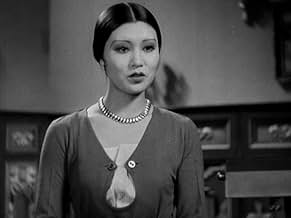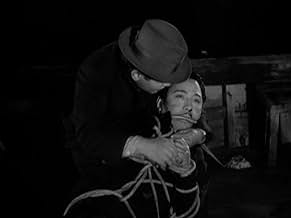A hatchet man is ordered to kill his close friend for the sake of Tong.A hatchet man is ordered to kill his close friend for the sake of Tong.A hatchet man is ordered to kill his close friend for the sake of Tong.
- Director
- Writers
- Stars
- Awards
- 2 wins total
J. Carrol Naish
- Sun Yat Ming
- (as J. Carroll Naish)
Edward Peil Sr.
- Bing Foo
- (as Eddie Piel)
Anna Chang
- Sing Girl
- (uncredited)
Blanche Friderici
- Madame Si-Si
- (uncredited)
Willie Fung
- Notary Fung Loo
- (uncredited)
- …
Anne Howard
- Young Girl
- (uncredited)
Ralph Ince
- 'Big Jim' Malone
- (uncredited)
Otto Lederer
- Pawnbroker
- (uncredited)
James B. Leong
- Tong Member
- (uncredited)
Gladys Lloyd
- Fan Yi
- (uncredited)
- Director
- Writers
- All cast & crew
- Production, box office & more at IMDbPro
Featured reviews
Naturally, the casting of Caucasian actors in Asian roles (see also "The Good Earth," "Dragon Seed," Charlie Chan, Mr. Moto, etc.) is a thing of the past. Casting Edward G. Robinson as a Chinese hit man is equivalent to doing a revival of "Flower Drum Song" with Hugh Jackman and Britney Spears. However, the plot of "The Hatchet Man" is well-thought out and surprisingly respectful of Chinese culture in America. Okay, they're killing each other, but is that any worse than, say, "The Godfather" series as relates to Italian-American culture? At least that don't have the Chinese characters saying things like, "Oh, me velly solly." Plus, the ending (which I won't spoil) is absolutely right and decidedly welcome.
I'm not a fan of yellow face for reasons that should be obvious, that said, I've seen a lot better. Except for Edward G. Robinson, most of the yellow face here is terrible, as is the characterization. If a bunch of white people are going to act as Chinese, they could at least make it more authentic. Almost any other actor starred in this, I would have given this a 3 or a 2.
But I recognize the near unmatched quality of Edward G. Robinson's film, who solely carries the film, and makes it watchable. Whether he's a deadly murderer, or on top of the Chinese world, or cheated on by his wife, or working lowly in the fields, or retrieving said wife from a person she was sold to... Edward G. Robinson's acting, especially physical, brings so much weight and life to the character, in his case only, I can honestly forget for a time that it;'s a yellow face character.
But I recognize the near unmatched quality of Edward G. Robinson's film, who solely carries the film, and makes it watchable. Whether he's a deadly murderer, or on top of the Chinese world, or cheated on by his wife, or working lowly in the fields, or retrieving said wife from a person she was sold to... Edward G. Robinson's acting, especially physical, brings so much weight and life to the character, in his case only, I can honestly forget for a time that it;'s a yellow face character.
I'm sure everyone has to mention the most obvious thing about this movie, that nearly all the characters are Chinese played by non-chinese actors. But this is no Charlie Chan with silly accents. None of the actors engage in cheap stereotypes. There's nothing here that's anywhere near as embarrassing as Mickey Rooney's Mr. Yunioshi in Breakfast at Tiffany's... or, much more recently, Johnny Depp's version of Tonto in The Lone Ranger.
The story itself depicts the Chinese American community in a generally favorable light... despite its focus being on the Tongs of San Francisco's Chinatown.
Robinson's Tong assassin is an honorable and admirable man, despite his profession.
So with that out of the way, this was a pretty great story and Robinson's character is complex. He wants to be free of his violent past as an assassin for the Tong, he wants to acclimate to life in the U.S. and be a good citizen... but he's also tied to tradition and sworn oaths. It's was less formulaic than I'd expect, I wasn't quite sure where it was leading till I was 3/4 through it. Seeing as it's pre-code it's not as overtly moralistic as later films. It looks great too. There are some nice sets and costumes and Ms. Young was particularly elegant. It's not a happy story, but it's entertaining and unusual. I'm kind of surprised someone hasn't remade it, with a less controversial cast.
So with that out of the way, this was a pretty great story and Robinson's character is complex. He wants to be free of his violent past as an assassin for the Tong, he wants to acclimate to life in the U.S. and be a good citizen... but he's also tied to tradition and sworn oaths. It's was less formulaic than I'd expect, I wasn't quite sure where it was leading till I was 3/4 through it. Seeing as it's pre-code it's not as overtly moralistic as later films. It looks great too. There are some nice sets and costumes and Ms. Young was particularly elegant. It's not a happy story, but it's entertaining and unusual. I'm kind of surprised someone hasn't remade it, with a less controversial cast.
A hatchet job is what I fully intended to do to this movie until I found some quiet time in the afternoon to watch it. In fact I gave it an 8/10 for novelty as well as pathos. The casting is preposterous. Can you imagine Edward G Robinson and Loretta Young as Chinese?
Eddie G plays a well respected Tong assassin who is forced to kill his childhood friend and blood brother (played by J Carroll Naish) witch was no surprise. He inherits the friends business and 6 year old daughter for his effort. He prospers and when the girl grows up, he marries her. I should mention that Loretta Young was only 19 when she made this movie and she was remarkably sexy and seductive. Along comes another Tong War and Eddie is pulled out of retirement to do his stuff. Meanwhile his young wife falls for the bodyguard and runs off with him. Loretta and her lover are deported to China for messing about with opium. Although Eddie is initially shamed by her betrayal, he eventually redeems himself and his reputation. After all, he is a hatchet man!
This is one of EGR's lesser known movies, but if you can get over the bizarre casting, the story really is gripping and the cast turns in a bravo performance.
Eddie G plays a well respected Tong assassin who is forced to kill his childhood friend and blood brother (played by J Carroll Naish) witch was no surprise. He inherits the friends business and 6 year old daughter for his effort. He prospers and when the girl grows up, he marries her. I should mention that Loretta Young was only 19 when she made this movie and she was remarkably sexy and seductive. Along comes another Tong War and Eddie is pulled out of retirement to do his stuff. Meanwhile his young wife falls for the bodyguard and runs off with him. Loretta and her lover are deported to China for messing about with opium. Although Eddie is initially shamed by her betrayal, he eventually redeems himself and his reputation. After all, he is a hatchet man!
This is one of EGR's lesser known movies, but if you can get over the bizarre casting, the story really is gripping and the cast turns in a bravo performance.
The Hatchet Man (1932)
So burdened with ethnic slandering—most of it "unintentional" at least—this movie is almost impossible to watch fairly. The basic story of inter-clan fighting and murder in the Chinese community (in San Francisco) is meant no doubt to have echoes in Italian mobster killings, and therefore have a wider appeal. But when the main characters are played by very non-Chinese talents (a product of the prejudice in Hollywood at the time), there is a constant woe and disbelief on many levels.
Of course, these problems are exactly why a "student' of early Hollywood should watch this. This is a way to get some sense of the problem these movies present. And there are additional reasons to see this—mainly the two really famous actors of the period doing their best to be Chinese. Edward G. Robinson is of course one of the greats of the era, an odd but searingly talented actor, and he plays well the head of one of the Chinese clans (or tongs). His wife has a smaller role but important —and so Loretta Young, a rising, fresh star, does what she can.
Nothing can redeem all this. The title refers to the violence of the subculture, where the solution for dishonor is death (by hatchet, literally).
There is the simplest of attempts to show how the Chinese were assimilating at the time. In a way the movie shows some shred of real life for the Chinatowns of America. The secondary theme here is love, and a kind of arranged marriage. This conflicts in different ways and Robinson, playing a Westernized immigrant, faces one aspect of this New World he can't quite understand. There are a couple of turns of plot to keep you alert, and a crazy ending worth seeing.
It's great to see Warner Archive put this out there in a clean copy, ready for all our various social biases. Maybe that's why it's worth it on some level. Never mind that it is often stiff and slow. Judge it as you can.
So burdened with ethnic slandering—most of it "unintentional" at least—this movie is almost impossible to watch fairly. The basic story of inter-clan fighting and murder in the Chinese community (in San Francisco) is meant no doubt to have echoes in Italian mobster killings, and therefore have a wider appeal. But when the main characters are played by very non-Chinese talents (a product of the prejudice in Hollywood at the time), there is a constant woe and disbelief on many levels.
Of course, these problems are exactly why a "student' of early Hollywood should watch this. This is a way to get some sense of the problem these movies present. And there are additional reasons to see this—mainly the two really famous actors of the period doing their best to be Chinese. Edward G. Robinson is of course one of the greats of the era, an odd but searingly talented actor, and he plays well the head of one of the Chinese clans (or tongs). His wife has a smaller role but important —and so Loretta Young, a rising, fresh star, does what she can.
Nothing can redeem all this. The title refers to the violence of the subculture, where the solution for dishonor is death (by hatchet, literally).
There is the simplest of attempts to show how the Chinese were assimilating at the time. In a way the movie shows some shred of real life for the Chinatowns of America. The secondary theme here is love, and a kind of arranged marriage. This conflicts in different ways and Robinson, playing a Westernized immigrant, faces one aspect of this New World he can't quite understand. There are a couple of turns of plot to keep you alert, and a crazy ending worth seeing.
It's great to see Warner Archive put this out there in a clean copy, ready for all our various social biases. Maybe that's why it's worth it on some level. Never mind that it is often stiff and slow. Judge it as you can.
Did you know
- TriviaEdward G. Robinson's wife at the time, Gladys Lloyd, appears uncredited as "Fan Yi". They were married from 1927 to 1956 and she would appear in five films with him from 1931-32.
- GoofsWhen Wong Low Get displays the scar on his left arm to the Tong; he places his right arm palm down over his left and pulls back the sleeve. But on the next immediate cut which is a close-up of the arm; he now has his right arm palm up under the left arm.
- Quotes
Wong Low Get: Sometimes it is better that the eye should not see what the hand is doing.
- ConnectionsEdited into Torchy Blane in Chinatown (1939)
- How long is The Hatchet Man?Powered by Alexa
Details
- Runtime
- 1h 14m(74 min)
- Color
- Sound mix
- Aspect ratio
- 1.37 : 1
Contribute to this page
Suggest an edit or add missing content























